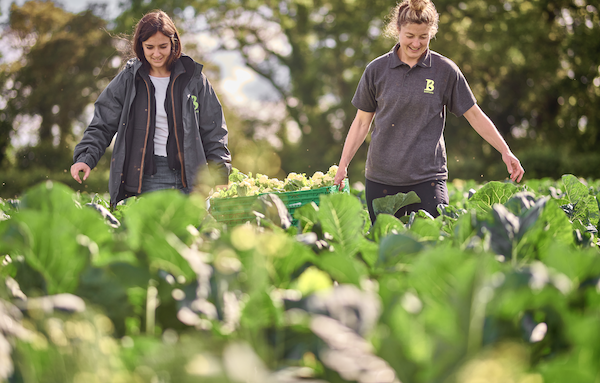Season’s eatings: better for you, better for the planet | Mindful Chef
This month, our new Mindful Chef Dietitian, Clare, is going to be delving into the topic of seasonal eating and why it matters. If you didn’t see her gut health series last month, we’ll take a moment to introduce you to her: Clare is a professional chef who loves food and has over 15 years of experience as a registered dietician. She takes a holistic approach to health and nutrition and shares her most important, evidence-based tips below.

For everyone at Mindful Chef, eating seasonally is really important to us. Reducing the miles – and time – from farm to plate means less C02. You get more fresh taste on your plate. And more nutrients to get your body working optimally. It helps us champion our great British suppliers, who in turn champion their own sustainable farming practices. Like Barfoots who supply your squash, sweet potatoes and so much more; The Tomato Stall bringing aubergines and tomatoes to the table; Ocean Fish making sure you eat seasonal species, right through to Walsh Mushrooms, Ben Rigby Game (hello, pheasant) and even the British Quinoa Company.
To round off the month of seasonal and sustainable eating, we’ve crafted a range of seasonal stars you can look forward to eating, and know you’re doing your bit for the planet, too. Happy reading!
Seasonal and sustainable

on the family menu 7th – 13th November.
Seasonal eating is said to be fresher, more nutritious and kinder to the planet. But the concept of a sustainable diet combines two very complex, very different perspectives. Firstly, nutrition, which focuses on the health and wellbeing of individuals; and global sustainability, which encompasses wider environmental, economic and social issues.
When considering the complexities and connections between these two issues, seasonal eating is often suggested as part of the solution to creating more sustainable food systems.
Why eating seasonally matters:
Why does eating seasonally matter? In this blog, I will delve into what seasonality means, and look at the science underpinning the benefits to both our health – and our planet.
Our food and agricultural systems have changed drastically in the last century. Intensive industrial farming practices, new technologies and the expansion of global food markets means we have year-round access to many foods that would typically have limited availability (if they were produced in their natural growing season).
But this has come at a cost. Higher energy usage, significant increases in greenhouse gas emissions, higher use of agri-chemicals, as well as more land use, as well as a loss of species and crop diversity.
What does seasonality mean?

The interpretation of what seasonal food is can vary widely. It’s often thought that seasonal food has to be produced locally (but this isn’t the case!). There’s also a bias to focus on fruit and veg – although other crops, meat and fish are also seasonal. For example, a food produced in the natural growing season in another country then imported and consumed in the UK can be classed as seasonal.
Did you also know that a food that is grown locally in the natural growing season then stored and eaten 6 months later can still be classed as seasonal?
Seasonal eating and greenhouse gas emissions (GHGE)
Our food system has been shown to have considerable detrimental implications on the environment, including:
- Increased production of greenhouse gas emissions (GHGE) which impacts on climate change
- Increased water use
- Decreased biodiversity
- Increased pollution
- Increased land use
These are incredibly complex issues, with very little scientific research exploring them all together in relation to seasonality. But some studies do indicate that eating foods that are in season may help decrease the harm being done to our environment.
Emissions and seasonality

Current agricultural practices account for approximately a quarter of global GHGE, with livestock production having the greatest contribution. It is estimated to be responsible for about 14% of all emissions globally.
Some aspects of eating food that is in season may actually reduce emissions. This is due to crops not requiring the high-energy input from artificial heating or lighting needed out of the natural growing season. Numerous case studies have shown that the total emissions of some food produced out of season in the UK – in heated glasshouses for example – are higher than the same product grown naturally in season abroad and transported to the UK.
Some scientists argue that adopting a seasonality approach to food supplies may also help to decrease water stress in already water scarce countries. For example, a study conducted in 2012 compared raspberries produced in the UK and Spain and demonstrated that in terms of GHGE there was little difference, but the water stress placed on the country was significantly higher in Spain.
Industrialisation and intensification of agriculture has led to a food system where nutritional intakes are dominated by only a few crop species and largely dependent on monocultures. This may lead to the loss of important nutrient dense varieties of plants in the diet. It is estimated that about 90% of our food supply is now derived from plants coming from a total of only about 100 crop species.
Seasonal eating and nutrition

A similar argument could be made against increasing the global supply of out-of-season fresh food because of the increased land it will require, which will have knock-on effects for loss of environmental biodiversity.
When considering what sustainable diets mean, focused on sustaining the health and wellbeing of individuals, it’s important to make sure that diets contain all the nutrients needed to help us function at an optimum level. Scientists agree that the constituents of a healthy diet are based around minimally processed plant-based foods.
Where you live in the world – and which definition of seasonality you use – is a key factor in whether seasonal eating can equate to a balanced and nourishing diet. In the case of local seasonality in the UK (produced and consumed in the same climatic zone), it would be possible to eat only seasonal food, but due to the limited variety of produce during the winter months, it may not be very appealing living on a diet of root veg.
The nutrient content of plants and animals can vary depending on where they are grown and reared and the season. Evidence suggests that the nutrient density of fruit and vegetables is at the optimum immediately after harvest, and then declines over time. Therefore time from harvest to consumption has a bearing on nutrient quality. Which is why Mindful Chef’s farm to fork model may be more nutritionally beneficial than supermarket produce that has longer supply chains. Some methods of preservation such as freezing will also slow the degradation of nutrients (so don’t discount those frozen peas!).
Fresh produce has been stored or preserved in some way to extend the period that food is available for hundreds of years, through techniques such as fermenting, drying, salting, smoking, pickling and freezing. Some methods of preservation can actually increase the nutrient quality of a product; for example nutrients such as lycopene in canned tomatoes are more easily absorbed (bioavailable) than in fresh tomatoes.
A study using a methodology developed to meet dietary requirements and minimise GHGE was repeated with the additional criteria of only including fruit and vegetables available in the UK in December. Although nutrient requirements were met, it was not possible to create a diet that would be seen by most people in the UK as acceptable using only seasonal fruit and vegetables in the winter. To achieve a realistic 7-day menu, fruit and vegetables in season abroad (e.g. oranges, lemons), stored in the UK (e.g. apples, pears) or preserved (e.g. dried fruit) had to be added to the diet, as well as some basic vegetables such as onions or tomatoes that were taken from storage or as tinned items. The study illustrated that while it would be possible to eat only seasonal food and meet dietary requirements, the limited range of foods would be a substantial barrier for many.
How to eat seasonally in a healthy way

Eating healthily and in a seasonal, sustainable way can be very complex. When looking at the issues holistically, various facets related to how best to support individual health and environment can appear to be at odds with one another.
In order to have a consistent and balanced way of eating, avoiding extremes within our diet is important. Based on the evidence, having a diet that is exclusively seasonal and locally sourced is not achievable for the majority of people in the UK.
However the science does suggest that including some foods in our diet that are in season, using either definition, is achievable and of benefit for our individual health and that of our wider environment. Including foods that have been harvested in season and then preserved (frozen, dried, canned or stored) can help you to achieve the balance of macronutrients and micronutrients you need.
Like many aspects of eating well, eating seasonal foods is about achieving a balance, in this case between minimising the environmental cost and optimising the nutritional quality of our diet.
—————
TRANSCOM ISP – Free Sigma HSE Email
Level 6 Domain Names are FREE – Register Now.
